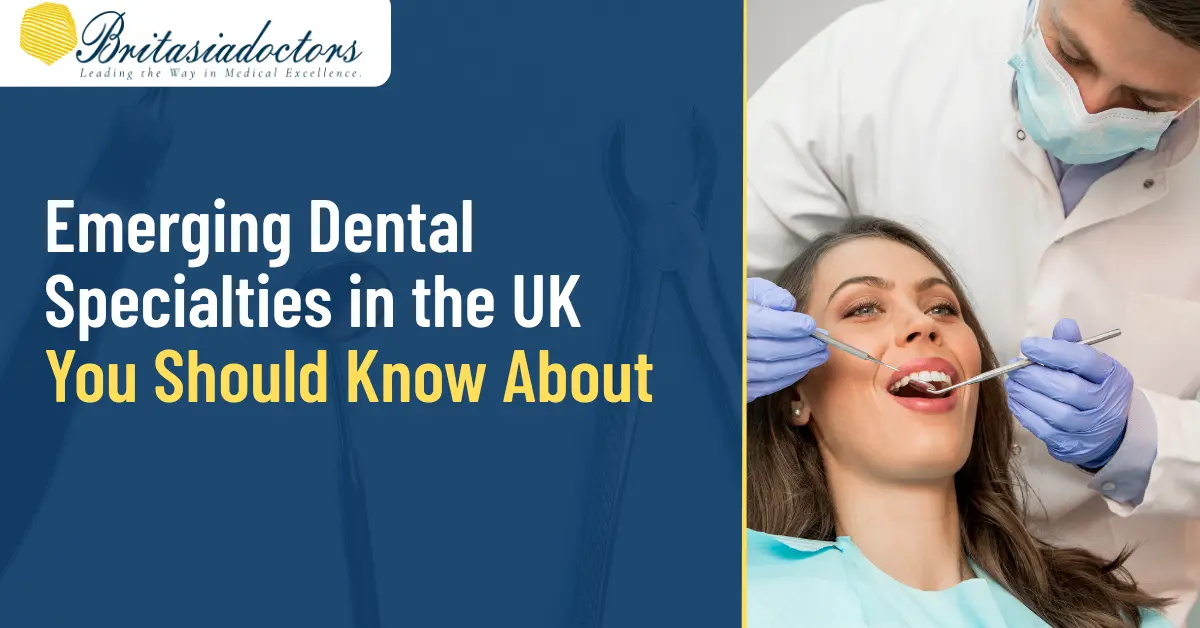
New and Emerging Dental Specialties Reshaping the UK Dental Industry
The UK dental landscape is experiencing unprecedented transformation, with new specialties and innovative fields reshaping how oral healthcare is delivered. Whether you're a dental professional considering career advancement or a patient seeking specialized care, understanding these emerging dental specialties can help you navigate the evolving world of modern dentistry.
Special Care Dentistry
Special Care Dentistry has emerged as one of the fastest-growing specialties in the UK, addressing the needs of patients with physical, sensory, intellectual, mental, medical, emotional, or social impairments. Currently, there are 317 dentists on the Specialist List for Special Care Dentistry in the UK, with training typically lasting 3-4 years. This specialty has gained prominence as healthcare providers recognize the importance of accessible dental care for elderly patients, those with disabilities, and individuals with complex medical conditions.
The demand for special care dentists continues to rise due to the UK's aging population and increased awareness of inclusive healthcare practices. These specialists work in various settings, from community dental services to hospital-based clinics, providing tailored treatment approaches for vulnerable patient groups.
Digital Dentistry and AI Integration
Digital dentistry represents a revolutionary shift in how dental professionals diagnose and treat patients. With 87% of UK dental practices adopting AI tools and 95% planning AI integration within five years, this emerging specialty combines traditional dental expertise with cutting-edge technology. The field encompasses multiple innovative approaches including 3D imaging, digital impressions using intraoral scanners, computer-guided surgical procedures, and AI-powered diagnostic systems.
Digital dentists utilize CAD/CAM systems for rapid fabrication of dental restorations, reducing turnaround times while enhancing customization. The integration of artificial intelligence enables earlier detection of dental issues, more accurate radiograph analysis, and predictive modeling of potential oral health concerns. Career opportunities in this emerging field include AI Dentist roles, Dental Data Scientists, AI Dental Consultants, and Dental AI Engineers.
Dental Anesthesiology
The rise of dental anesthesiology as a distinct specialty addresses the growing need for advanced sedation techniques and anxiety management in dentistry. This field has gained significant traction due to increasing dental anxiety among patients and the rising number of medically complex cases requiring specialized anesthetic care. Dental anesthesiologists ensure safe, comfortable experiences for patients undergoing lengthy procedures, oral surgeries, and pediatric dental treatments involving uncooperative children.
Recent advancements explored at international conferences like Anesthesia 2025 include innovations in local and general anesthesia applications, enhanced safety protocols, and techniques for managing complications. As patient experience becomes increasingly prioritized in healthcare delivery, demand for dental anesthesiology specialists continues to expand across UK practices.
Teledentistry
Teledentistry has transformed from a pandemic necessity to an established specialty with substantial growth potential. The UK teledentistry market is projected to reach £225.4 million by 2030, with an impressive compound annual growth rate of 16.6%. This specialty encompasses tele-consultations (accounting for 47.3% of the market), remote diagnostics, virtual treatment planning, and continuing education for dental professionals.
Teledentistry proves particularly valuable for connecting patients in remote or underserved locations with specialized dental expertise, eliminating geographical and physical barriers to care. Cloud-based teledentistry solutions, representing 44.3% of delivery modes, enable dentists to access patient data securely from any location while reducing operational costs. The specialty has applications across oral medicine, operative dentistry, periodontics, and orthodontics.
Orthodontics and Clear Aligner Therapy
Modern orthodontics has evolved far beyond traditional metal braces, with clear aligner therapy driving unprecedented growth in the specialty. Adult patients now represent a significant proportion of orthodontic cases, seeking discreet solutions like Invisalign that accommodate professional lifestyles. The specialty has embraced technological innovations including 3D scans, AI-powered treatment planning, and digital workflow integration that improve alignment precision and efficiency.
UK orthodontic training typically requires three years of specialty training, followed by an additional two-year post-CCST period. The rising demand for aesthetic and functional orthodontic solutions across all age groups positions this specialty for continued expansion.
Prosthodontics
Prosthodontics focuses on full-mouth rehabilitation and smile restoration through advanced techniques including bridges, crowns, dentures, implant-supported restorations, and cosmetic improvements. The specialty addresses growing patient populations with missing teeth and those requiring comprehensive dental reconstruction. Training in prosthodontics requires three years of specialty education.
The aesthetic appeal of prosthodontics aligns perfectly with increasing consumer interest in cosmetic dentistry, including teeth whitening, veneers, and complete smile makeovers driven by rising aesthetic consciousness. Advancements in restorative materials have produced stronger, more durable solutions that enhance the longevity of dental restorations.
Periodontics with Advanced Technologies
Periodontics continues expanding as awareness grows about the connection between gum health and serious systemic conditions like cardiovascular disease. With nearly half of adults aged 30 and above showing signs of gum disease according to National Institutes of Health studies, demand for periodontal specialists remains strong. Modern periodontists leverage advanced treatments including laser gum therapy, scaling, root planning, and minimally invasive surgical techniques.
The specialty's three-year training program prepares practitioners to address both preventive care and complex cases requiring surgical intervention. The increasing recognition of periodontal disease's impact on overall health has elevated the specialty's importance within comprehensive dental care.
Oral and Maxillofacial Surgery
Oral and Maxillofacial Surgery experiences rising demand driven by increased interest in dental implants, facial trauma cases, and reconstructive procedures. These specialists perform complex surgeries ranging from wisdom teeth extraction to jaw alignments, cleft lip reconstruction, and cosmetic jaw correction. The shortage of oral surgeons in the UK—with only 7,440 currently practicing according to supply and demand analyses—creates significant opportunities for new professionals entering the field.
Training for oral surgery typically requires 3-4 years depending on the specific pathway. The growing aging population requiring implant-based tooth replacement solutions continues driving demand for these highly specialized practitioners.
Pediatric Dentistry
Pediatric dentistry benefits from parents' stronger emphasis on early dental intervention and oral health education for children. This specialty treats common childhood dental issues while educating families about establishing long-term oral health habits. Pediatric dentists also serve young patients with special needs, creating additional growth avenues within the specialty.
The UK government's "Smile for Life" initiative, launched as part of NHS dentistry reform plans, focuses specifically on prevention and good oral health in young children through nurseries and primary school dental outreach programs in underserved areas. Training in pediatric dentistry requires four years, with the specialty currently transitioning to include an Intercollegiate Specialty Fellowship Exam post-CCST.
Why These Specialties Are Growing
Multiple factors drive the expansion of emerging dental specialties across the UK. Technological advancements in digital dentistry, AI, and minimally invasive procedures make sophisticated treatments more accessible. The aging population increasingly requires specialized care including dental implants, periodontal treatment, and full-mouth rehabilitations. Patient awareness about oral health's connection to overall well-being, including heart disease and diabetes, drives demand for preventive and specialized care.
The NHS Long Term Workforce Plan supports specialty growth by expanding dental undergraduate training places by 40% to more than 1,100 annually by 2031-2032, alongside similar increases for dental therapists and other dental care professionals. These initiatives ensure adequate workforce capacity to meet growing demand across all dental specialties.
Choosing the Right Specialty Path
For dental professionals considering specialty training, the General Dental Council recognizes 13 dental specialties with new curricula introduced from September 2024. Successful completion of specialty training leads to a Certificate of Completion of Specialty Training (CCST), qualifying professionals for entry onto the GDC Specialist List. Training durations vary from three years for specialties like endodontics, periodontics, and prosthodontics to five years for dental and maxillofacial radiology, oral medicine, and restorative dentistry.
The UK's three surgical royal colleges now collaborate on a tri-collegiate assessment approach covering 10 dental specialties, supporting trainees in demonstrating required specialist knowledge, skills, and capabilities. This coordinated framework ensures consistent, high-quality specialty education across the country.
Understanding these emerging dental specialties empowers both practitioners and patients to make informed decisions about career development and treatment options. As technology continues advancing and patient needs evolve, these specialties will play increasingly vital roles in delivering comprehensive, innovative oral healthcare across the UK



